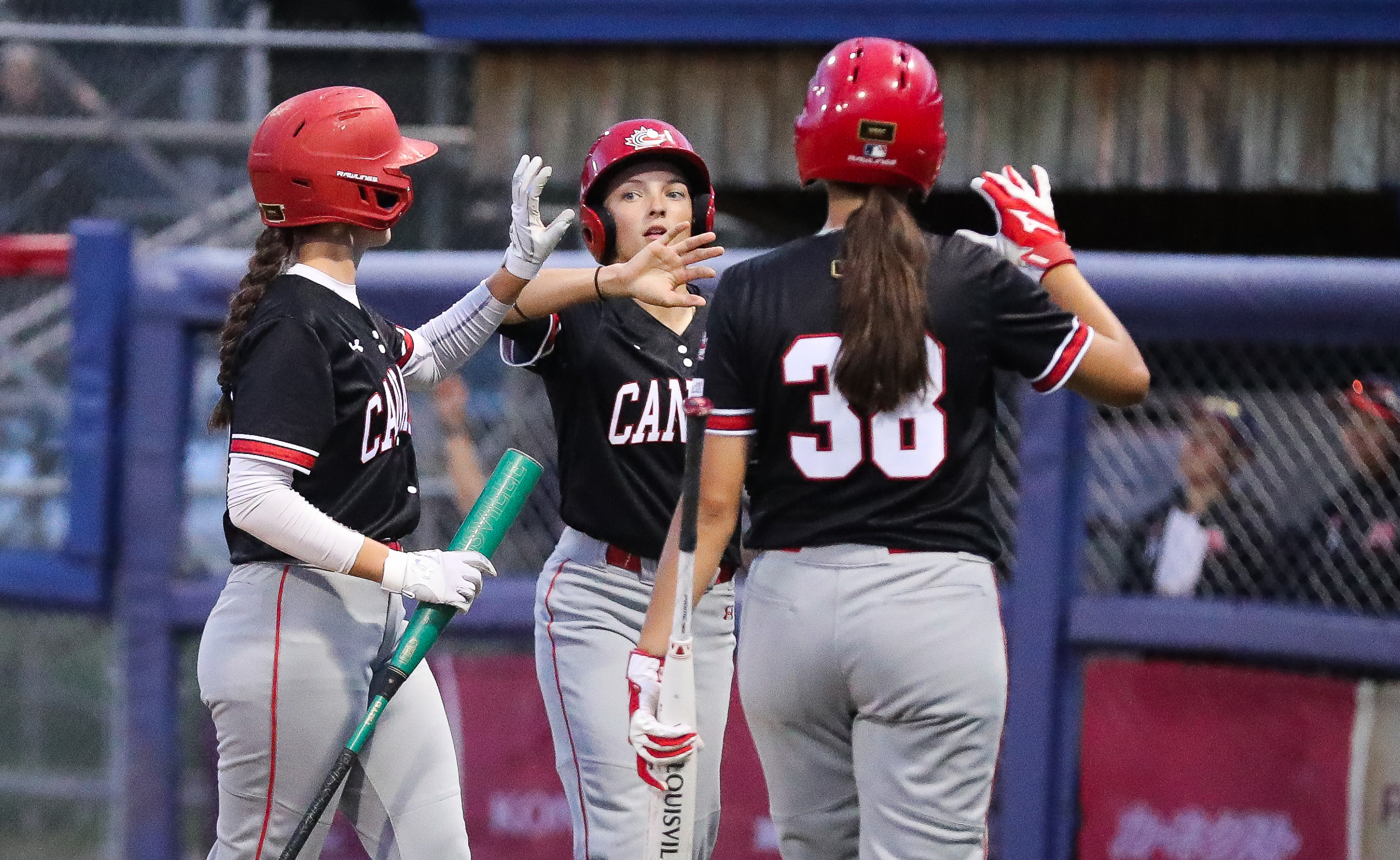
Par : Melissa Verge
Les meilleures joueuses de baseball au monde seront au Canada la semaine prochaine pour participer à une Coupe du monde qui a failli ne pas avoir lieu.
Pendant des mois, l'issue de la finale de la Coupe du monde féminine de baseball de la WBSC – qui donne aux meilleures joueuses du pays une motivation hors du commun et aux jeunes filles un objectif tangible à atteindre – a été incertaine en raison d'un manque de financement.
C'est grâce à une généreuse contribution de 300 000 $ de Baseball Canada et aux longues heures de travail du personnel que l'événement a pu avoir lieu à Thunder Bay. Les demandes de financement de 300 000 $ du gouvernement fédéral ont d'abord été refusées en 2023 et en 2024. Après de nombreuses discussions, ils ont reçu 75 000 $, a déclaré le PDG de Baseball Canada, Jason Dickson, mais il leur manquait encore beaucoup d'argent, ce qui mettait en péril non seulement la Coupe du monde, puisqu'il n'y avait pas d'autre comité organisateur, mais aussi l'ensemble du programme de l'équipe nationale féminine. Ce programme existe depuis 2004.
« Si le Canada n'accueille pas les qualifications de la phase de groupe (en 2023) et la finale de la Coupe du monde cette année, nous n'aurons pas de compétition ces années-là et nous perdrons tout l'élan que nous avons dans le baseball féminin. Cela pourrait potentiellement tuer le programme féminin pour toujours », a déclaré Dickson.
En 2022, la première étape des qualifications pour la Coupe du monde de baseball féminin s'est déroulée au Venezuela, avec la participation de pays des Amériques. En raison des restrictions de voyage, le Canada et les États-Unis n'ont pas pu participer à la compétition. L'Association internationale de baseball de Thunder Bay a donc pris l'initiative d'accueillir les deux pays pour une série de cinq matchs lors de la Série de l'amitié.
Il s'agissait de la première compétition internationale de baseball pour les deux pays depuis 2019, en raison de la pandémie de Covid-19. Thunder Bay a ensuite obtenu l’organisation pour la phase de groupe (2023) et la phase finale (2024) de la Coupe du monde féminine.
Lors du tournoi tenu en 2023, le comité organisateur de l'Association internationale de baseball de Thunder Bay a accusé un déficit de 250 000 $, et cette année, c'est Baseball Canada qui a encaissé le coup.
C'est une première pour leur organisation. Elle n'a jamais eu à soutenir une compétition internationale, car elle a toujours été financée. Ce n'est pas à un organisme national de s'engager à ce point, a-t-il déclaré, et la contribution n'est pas annuelle. C'est une fois par décennie, a-t-il ajouté. Bien que cela représente une part importante de leur budget, l'alternative n'était pas envisageable. L'alternative, c'était « pas de Coupe du monde ».
« Cela n'allait pas se produire, il n'y aurait pas de compétition pour notre équipe et potentiellement pour d'autres, a-t-il déclaré. Mais pour nous, cela signifiait beaucoup et la décision a été simple. Nous nous sommes simplement dit que ce n'était pas possible et que nous allions trouver un moyen de le faire. »
Trouver une solution a signifié beaucoup de longs appels téléphoniques étalés sur plusieurs heures entre lui et Adam Morissette de Baseball Canada, qui supervise les opérations du programme féminin. Il s'agissait d'un grand nombre de personnes qui s'intéressaient profondément et s'investissaient énormément, dit-il, et qui n'acceptaient pas un refus comme réponse.
Mais l'enjeu est encore plus profond et plus monumental que le tournoi d'une semaine qui s'annonce. Avoir des modèles féminins à admirer sur le terrain est vital pour la participation future des filles à ce sport.
Des études ont montré que les enfants commencent à écarter les options de carrière dès leur plus jeune âge et ce qu'ils considèrent comme réalisable est souvent ce qu'ils voient dans les médias.
C'est pourquoi l'organisation de la Coupe du monde au Canada est importante, car elle montre aux jeunes filles du pays ce qu'il est possible de faire.
« Il faut le voir si l'on veut le devenir ou y croire. Il faut que les jeunes athlètes aient l'occasion de voir leurs modèles », a déclaré M. Dickson.
Entre 2005 – un an après la création de l'équipe nationale féminine - et 2023, le nombre de joueuses a doublé dans tout le pays. En 2005, il y avait un peu moins de 13 000 joueuses inscrites, tel que rapporté à Baseball Canada par les dix associations provinciales. En 2023, ce nombre s'élèvera à près de 27 000.
L'intérêt est là, mais les joueuses ont aussi besoin de soutien. Il est essentiel que les commanditaires et le gouvernement fassent leur part, a déclaré M. Dickson. Les particuliers peuvent également se mobiliser en achetant des billets pour la Coupe du monde. Cela permettra aux femmes et aux filles de tout le pays de continuer à avoir les opportunités qu'elles méritent dans le baseball, d'avoir des modèles à admirer et d'avancer vers un avenir plus inclusif.
Baseball Canada a soutenu le programme et a maintenant besoin de l'aide du gouvernement et des commanditaires pour s'assurer qu'il se poursuive.
« Le baseball est définitivement une bataille difficile du côté des femmes, mais vous savez, je pense que notre engagement à cet égard a montré que nous sommes prêts à nous battre », a-t-il déclaré.
« Mais nous aurons besoin de plus d'aide. »